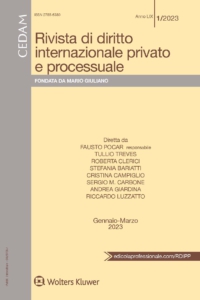Views
Petronas Lubricants: ECJ confirms that Art 20(2) Brussels I can be used by employer for assigned counter-claim
Last Thursday, the ECJ rendered a short (and rather unsurprising) decision on the interpretation of Art 20(2) Brussels I (= 22(2) of the Recast Regulation). In Petronas Lubricants (Case C 1/17), the Court held that an employer can rely on the provision to bring a counter-claim in the courts chosen by the employee even where said claim has been assigned to the employer after the employee had initiated proceedings.
The question had been referred to the ECJ in the context of a dispute between an employee, Mr Guida, and his two former employers, Petronas Lubricants Italy and Petronas Lubricants Poland. Mr Guida’s parallel employment contracts with these two companies had been terminated among allegations of wrongly claimed reimbursements. Mr Guida, who is domiciled in Poland, had sued his Italian employer in Italy for wrongful dismissal and his employer had brought a counter-claim for repayment of the sums Mr Guida had allegedly wrongfully received, which had been assigned by the Polish employer.
Art 20(2) Brussels I contains an exception to the rule in Art 20(1), according to which an employee can only be sued in the courts of their country of domicile, to allow the employer to bring a counter-claim in the courts chosen by the employee. Similar exceptions can be found in Art 12(2) Brussels I (= Art 14(2) of the Recast; for insurance contracts) and Art 16(3) Brussels I (= Art 18(3) of the Recast; for consumer contracts), all of which incorporate the ground for special jurisdiction provided in Art 6 No 3 Brussels I (= Art 8(3) of the Recast). In the present case, the ECJ had to decide whether this exception would also be available for counter-claims that had been assigned to the employer after the employee had initiated proceedings.
The Court answered this question in the affirmative, pointing out that
[28] … provided that the choice by the employee of the court having jurisdiction to examine his application is respected, the objective of favouring that employee is achieved and there is no reason to limit the possibility of examining that claim together with a counter-claim within the meaning of Article 20(2) [Brussels I].
At the same time, the Court emphasised that a counter-claim can only be brought in the court chosen by the employee if it fulfils the more specific requirements of Art 6 No 3 Brussels I, according to which the counter-claim must have arisen ‘from the same contract or facts on which the original claim was based’. This has recently been interpreted by the ECJ (in Case C-185/15 Kostanjevec) as requiring that both claims have ‘a common origin’ (see [29]–[30] of the decision). Where this is the case – as it was here (see [31]–[32]) –, it does not matter that the relevant claims have only been assigned to the employer after the employee had initiated proceedings (see [33]).
Mareva injunctions under Singapore law
Whether the Singapore court has the jurisdiction or power to grant a Mareva injunction in aid of foreign court proceedings was recently considered by the Singapore High Court in PT Gunung Madu Plantations v Muhammad Jimmy Goh Mashun [2018] SGHC 64. Both plaintiff and defendant were Indonesian and the claim related to alleged breaches of duties which the defendant owed to the plaintiff. The plaintiff had obtained leave to serve the writ in Indonesia on the defendant. The defendant thereupon applied, inter alia, to set aside service of the writ and for a declaration that the court has no jurisdiction over him. In response, the plaintiff applied for a Mareva injunction against the defendant in respect of the defendant’s assets in Singapore. The plaintiff had, after the Singapore action was filed, commenced actions in Malaysia and Indonesia covering much the same allegations against the defendant.
Under Singapore law (excluding actions commenced in the Singapore International Commercial Court where different rules apply), leave to serve the writ on the defendant abroad may be granted at the court’s discretion if the plaintiff is able to show: (i) a good arguable case that the claim falls within one of the heads of Order 11 of the Rules of court; (ii) a serious issue to be tried on the merits; and (iii) Singapore is forum conveniens. On the facts, the parties were Indonesian and the alleged misconduct occurred in Indonesia. As the plaintiff was unable to satisfy the third requirement, the court discharged the order for service out the writ out of the jurisdiction. Other orders made in pursuant of the order for service out were also set aside.
On the Mareva injunction, the Singapore High Court adopted the majority approach in the Privy Council decision of Mercedes Benz v Leiduck [1996] 1 AC 284. Lord Mustill had distinguished between two questions, to be approached sequentially: first, the question of whether the court has in personam jurisdiction over the defendant; secondly, the question of whether the court has a power to grant a Mareva injunction to restrain the defendant from disposing of his local assets pending the conclusion of foreign court proceedings. Valid service is required to found in personam jurisdiction under Singapore law. In PT Gunung Madu Plantations, as in Mercedes Benz itself, as the answer to the first question was in the negative, the second question did not arise.
Justice Woo was cognisant of the difficulties caused by hewing to the traditional approach of viewing Mareva relief as strictly ancillary to local proceedings but stated ‘that is a matter that has to be left to a higher court or to the legislature’ (para 54). His Honour referenced developments in the UK and Australia, where freestanding asset freezing orders in aid of foreign proceedings are permitted. Further, the Singapore International Arbitration Act was amended in 2010 to give the court the power to grant an interim injunction in aid of a foreign arbitration. It is likely that legislative intervention will be required to develop Singapore law on this issue.
The judgment may be found here: http://www.singaporelaw.sg/sglaw/laws-of-singapore/case-law/free-law/high-court-judgments/23135-pt-gunung-madu-plantations-v-muhammad-jimmy-goh-mashun
Nori Holdings: England & Wales High Court confirms ‘continuing validity of the decision in West Tankers’ under Brussels I Recast
Earlier this month, the English High Court rendered an interesting decision on the (un-)availability of anti-suit injunctions in protection of arbitration agreements under the Brussels I Recast Regulation (No 1215/2012). In Nori Holdings v Bank Otkritie [2018] EWHC 1343 (Comm), Males J critically discussed (and openly disagreed with) AG Wathelet’s Opinion on Case C-536/13 Gazprom and confirmed that such injunctions continue to not be available where they would restrain proceedings in another EU Member State.
Read more
News
Rivista di diritto internazionale privato e processuale (RDIPP) No 1/2023: Abstracts
 The first issue of 2023 of the Rivista di diritto internazionale privato e processuale (RDIPP, published by CEDAM) was just released. It features:
The first issue of 2023 of the Rivista di diritto internazionale privato e processuale (RDIPP, published by CEDAM) was just released. It features:
Francesco Salerno, (formerly) Professor at the University of Ferrara, L’impatto della procedura di interpretazione pregiudiziale sul diritto internazionale privato nazionale (The Impact of the Preliminary Rulings of the Court of Justice on National Private International Law; in Italian)
The European Court of Justice’s uniform interpretation of private international law concerns mainly – albeit not only – the EU Regulations adopted pursuant to Article 81 TFEU: in the context of this activity, the Court also takes into account the distinctive features of EU Member States. The increasing number of autonomous notions developed by the Court greatly enhanced the consistency and the effectiveness of the European rules. Against this background, the Italian judicial authorities implemented such a case-law even when it ran counter well-established domestic legal principles. Moreover, the European institutions rarely questioned the case-law of the Court of Justice, but when they did so, they adopted new rules of private international law in order to “correct” a well-settled jurisprudential trend of the Court.
EU-ADAPT App launched
Readers of this blog will certainly enjoy trying
It is the result of a project coordinated by Afonso Patrão (University of Coimbra, in Portugal), joining efforts with the Universities of Heidelberg (Germany), Turku (Finland), Genoa (Italy) and Valencia (Spain), which will be useful when a right in rem is invoked under the law applicable to succession, but the lex rei sitae does not know such right in rem. As Afonso Patrão explains “the app will then suggest an equivalent under the law of the latter Member State, taking into account the aims and the interests pursued by the specific right in rem and the effects attached to it”.
Virtual Workshop (in German) on July 4: Robert Freitag on The Overdue Reform of the International Law on Names in Germany
 On Tuesday, July 4, 2023, the Hamburg Max Planck Institute will host its 35th monthly virtual workshop Current Research in Private International Law at 14:00-15:30 CEST. Robert Freitag (FAU Erlangen-Nürnberg) will speak, in German, about the topic
On Tuesday, July 4, 2023, the Hamburg Max Planck Institute will host its 35th monthly virtual workshop Current Research in Private International Law at 14:00-15:30 CEST. Robert Freitag (FAU Erlangen-Nürnberg) will speak, in German, about the topic
The Overdue Reform of the International Law on Names in Germany
The presentation will be followed by open discussion. All are welcome. More information and sign-up here.
If you want to be invited to these events in the future, please write to veranstaltungen@mpipriv.de.


